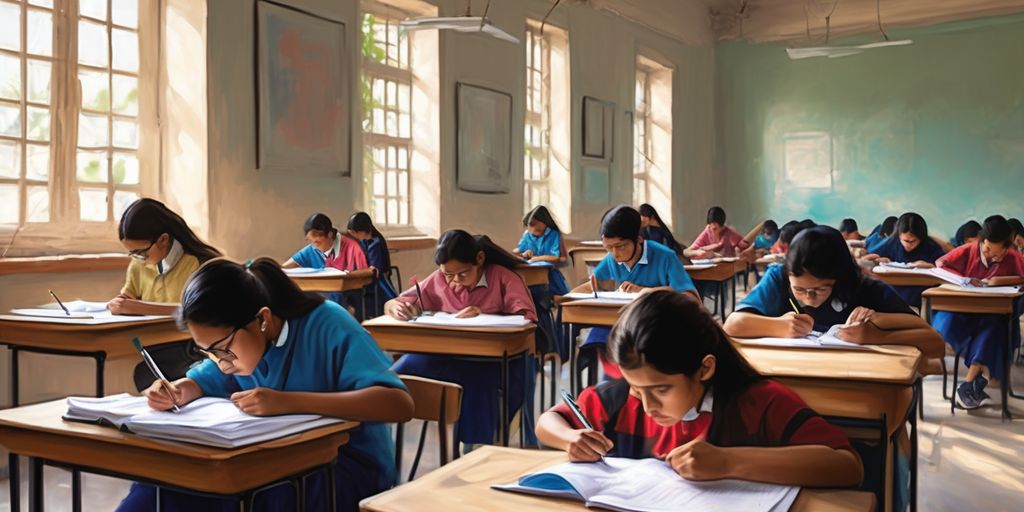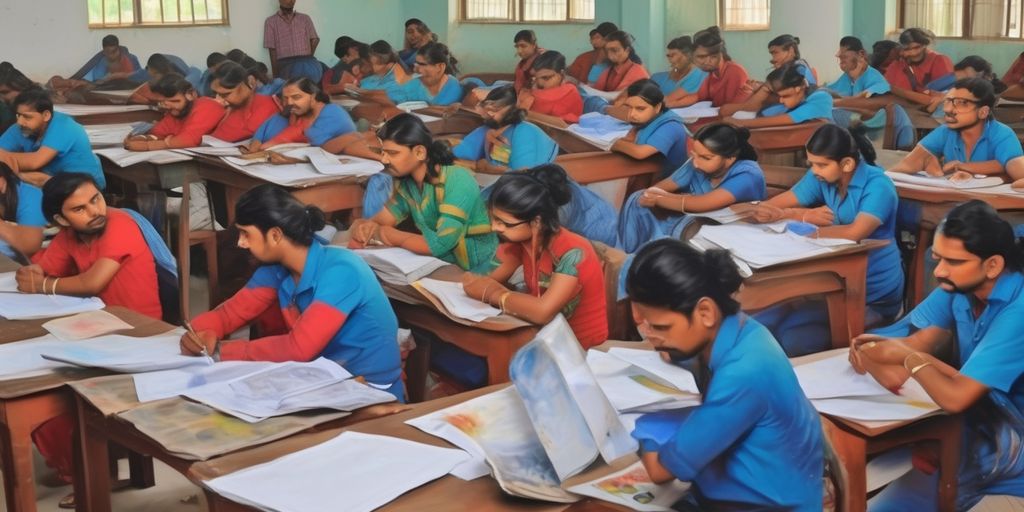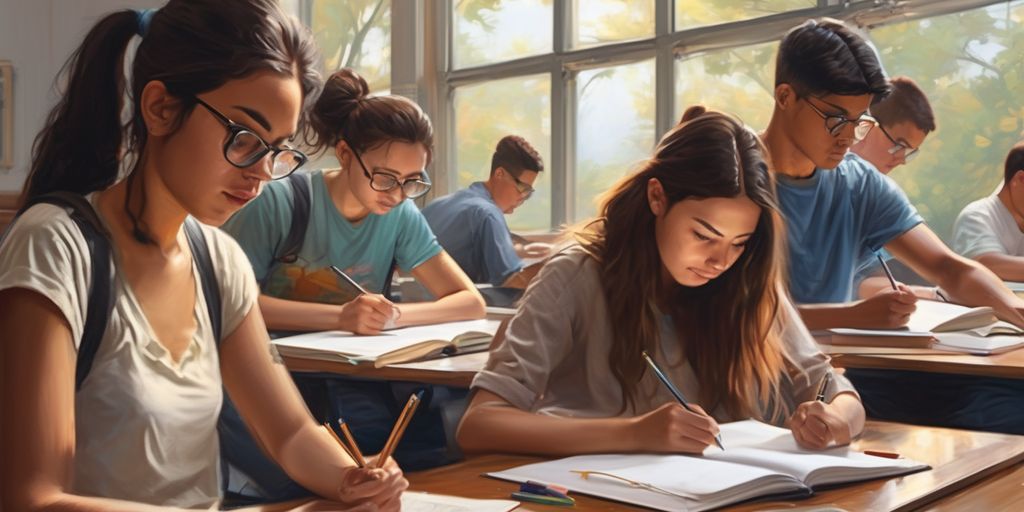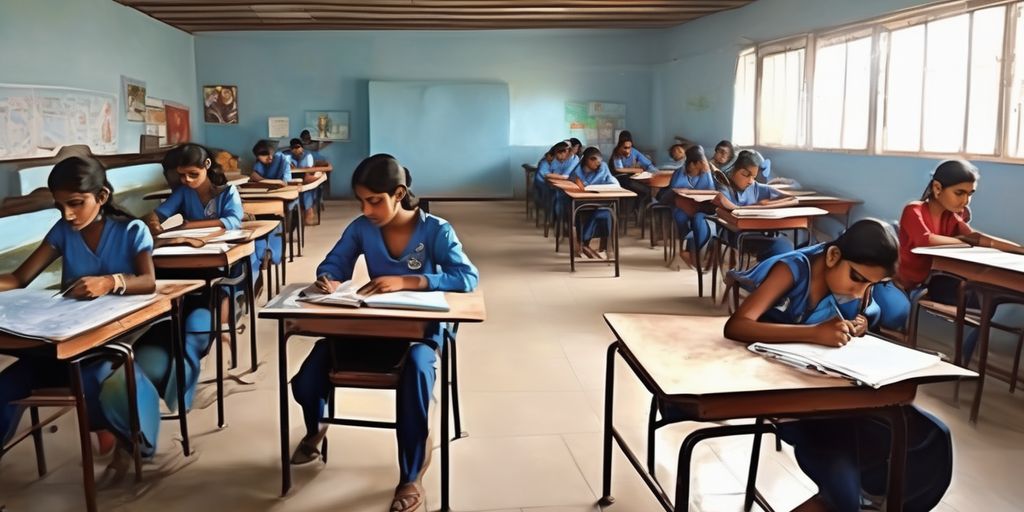Mock tests are super important for anyone getting ready for exams. They help you figure out where you need to improve and get you used to the exam setting. By looking at your mistakes in these tests, you can learn a lot and do better next time. This article will guide you on why mock tests matter and how to learn from them.
Key Takeaways
- Mock tests help you see where you need to improve.
- They make you feel more comfortable with the real exam setting.
- Reviewing your mistakes helps you learn better.
- Mock tests can reduce exam stress and build confidence.
- Using technology can make analyzing mock tests easier.
Understanding the Role of Mock Tests in Exam Preparation
Mock tests are a crucial part of exam preparation. They are designed to mimic the actual exam environment, helping students get used to the pressure and time constraints they will face on the big day. By taking mock tests, students can test their knowledge, identify gaps, and build the stamina needed for long exams. More importantly, mock tests provide invaluable insights into a student’s preparation level.
Why Mock Tests Are Essential
Mock tests are essential because they help students assess their knowledge. They highlight what students know well and what they need to focus more on. By taking regular mock tests, students get a clear picture of their strengths and weaknesses. This self-assessment is crucial for planning a study schedule and focusing on areas that need improvement.
How Mock Tests Simulate Real Exam Conditions
Mock tests are prepared to resemble the actual examination. While students can gather plenty of information about the structure and pattern of an exam from online sources, only mock tests can help them understand how each section of a paper is structured. This real-time practice is crucial in building confidence and improving performance.
The Psychological Benefits of Taking Mock Tests
Taking mock tests also has psychological benefits. They help students get accustomed to the pressure and time constraints of the real exam. This familiarity can reduce anxiety and build confidence. Additionally, mock tests provide a reality check on how effective a student’s preparation is, helping them remember concepts and not forget what they have learned.
Identifying Common Mistakes in Mock Tests
Mock tests are a crucial part of exam preparation, but they can also reveal a lot about the common mistakes students make. Understanding these mistakes is the first step towards improving performance and achieving better results in the actual exam.
Effective Strategies for Analyzing Mock Test Results
Analyzing your mock test results is crucial for improving your performance. Here’s a step-by-step guide to help you get the most out of your review process.
Step-by-Step Guide to Reviewing Answers
After completing a mock test, your first task is to review all your answers. This should be done regardless of whether the answer was correct or incorrect. Understanding why you answered a question correctly is as important as knowing why you got another wrong. This review process helps you recognize patterns in your knowledge and problem-solving approach.
Tools and Techniques for Detailed Analysis
To make your analysis more effective, consider using tools like spreadsheets to track your performance. This can help in visualizing your progress and identifying patterns more effectively. Additionally, maintaining a journal of your mock test performances can be beneficial. Note down your scores, time taken, areas of improvement, and strategies that worked or didn’t work.
The Importance of Timely Review
Timely review of your mock test results is essential. The sooner you analyze your performance, the fresher the test will be in your mind, making it easier to identify and understand your mistakes. Regular and prompt analysis can significantly enhance your learning process and help you avoid repeating the same errors in the future.
Analyzing your mock test results promptly can turn your mistakes into valuable learning opportunities.
Learning from Mistakes: Turning Errors into Opportunities
Mistakes are a natural part of the learning process, especially when preparing for exams. Admitting your errors is the first step towards improvement. By analyzing where you went wrong, you can turn these mistakes into valuable learning opportunities.
How to Categorize Mistakes for Better Understanding
Categorizing your mistakes helps in understanding the root cause. Common categories include conceptual errors, poor time management, and careless mistakes. By identifying the type of mistake, you can focus on specific areas for improvement.
Strategies for Addressing Knowledge Gaps
Once you’ve identified your mistakes, it’s crucial to address the underlying knowledge gaps. This can be done through targeted practice and revision. Make a plan to revisit the topics where you struggled and use additional resources to strengthen your understanding.
The Role of Feedback in Continuous Improvement
Feedback is essential for continuous improvement. Whether it’s from teachers, peers, or online platforms, constructive feedback helps you understand your weaknesses and how to overcome them. Leveraging feedback effectively can significantly enhance your performance in future tests.
Remember, every mistake is an opportunity to learn and grow. By systematically analyzing and addressing your errors, you pave the way for success in your exams.
Using Technology to Enhance Mock Test Analysis
In today’s digital age, various tools and platforms can assist you in analyzing your performance. Online platforms offer detailed analysis of your mock tests, providing insights into your performance, time management, and areas of improvement. These platforms can help you track your progress and identify patterns in your mistakes.
Leveraging AI for personalized feedback is another powerful tool. AI can analyze your answers and provide specific feedback on where you went wrong and how to improve. This can be especially helpful in mastering complex subjects and improving your overall performance.
Digital tools also offer the benefit of convenience. You can take mock tests anytime and anywhere, making it easier to fit study sessions into your busy schedule. Additionally, these tools often come with features like timed tests and instant scoring, which can help you simulate real exam conditions and better prepare for the actual test.
Utilizing technological aids for effective study can significantly enhance your exam preparation. By analyzing questions and improving performance with mocks, you can turn your weaknesses into strengths and achieve your academic goals.
Focusing on Weak Areas: Targeted Practice
Mock tests are a great way to find out what you need to work on. By looking at your results, you can see which subjects or topics you need to spend more time on. This way, you can make a study plan that focuses on these weak areas and helps you get better faster.
The Psychological Aspect of Handling Mistakes
Maintaining a Positive Attitude
It’s natural to make mistakes during mock tests. Instead of getting discouraged, view them as opportunities to learn and improve. Maintaining a positive attitude is crucial for staying motivated and focused on your goals. Remember, every mistake is a step towards better understanding and mastery.
Dealing with Exam Anxiety
Exam anxiety can significantly impact your performance. To manage this, practice mindfulness techniques and develop a study routine that includes regular breaks. This helps in reducing stress and improving concentration. Recognize that anxiety is a common experience and can be managed with the right strategies.
Building Confidence Through Practice
Confidence comes from consistent practice and learning from your errors. By regularly taking mock tests and analyzing your mistakes, you can build a strong foundation of knowledge and skills. This not only prepares you for the actual exam but also boosts your self-confidence, making you more resilient in the face of challenges.
Underestimating mock tests and not analyzing results can lead to repeated mistakes. Make sure to review your performance and learn from each test to avoid mismanagement of study resources.
Time Management Skills: Learning from Mock Tests
Mastering time management is crucial for success in exams. Mock tests are an excellent way to practice and improve these skills. They help you understand the test structure, allocate time strategically, and balance speed with accuracy. By practicing with mock tests, you can synchronize with the test rhythm and enhance your performance.
Analyzing Time Spent on Each Section
After taking a mock test, it’s important to review how much time you spent on each section. This helps you identify which parts of the test took longer than expected and where you can improve. Create a table to track your time allocation for each section and compare it with the ideal time you should spend.
Strategies for Improving Speed and Accuracy
Improving speed and accuracy requires a combination of practice and strategy. Here are some tips:
- Prioritize Questions: Start with the questions you find easiest to build confidence and save time for tougher ones.
- Skip and Return: If a question is taking too long, skip it and return later if time permits.
- Practice Regularly: Consistent practice helps you get faster and more accurate over time.
Balancing Speed with Precision
While speed is important, accuracy should not be compromised. Striking a balance between the two is key. Focus on understanding the questions thoroughly before answering and avoid guesswork. This ensures that you maintain a high level of precision while working within the time limits.
Remember, mastering time management for CUET success involves understanding the test structure, allocating time strategically, practicing with mock tests, balancing speed and accuracy, and synchronizing with the test rhythm.
The Importance of Consistency in Taking Mock Tests
Consistency in taking mock tests is crucial for effective exam preparation. Regular practice helps students become familiar with the exam format and reduces anxiety. By setting a regular schedule for mock tests, students can track their progress over time and make necessary adjustments to their study plans. This consistent practice not only builds confidence but also highlights areas that need improvement.
Setting a Regular Schedule for Mock Tests
Establishing a routine for taking mock tests ensures that students are continuously engaged in their preparation. A regular schedule helps in maintaining a steady pace of study and prevents last-minute cramming. It is essential to treat these mock tests with the same seriousness as the actual exam to gain the most benefit.
Tracking Progress Over Time
Monitoring performance over multiple mock tests provides valuable insights into a student’s strengths and weaknesses. By analyzing the results, students can identify patterns in their mistakes and work on them. This ongoing assessment is vital for making informed decisions about where to focus their efforts.
Adjusting Study Plans Based on Performance
The data gathered from regular mock tests can be used to tailor study plans to address specific needs. If a student consistently struggles with a particular subject or type of question, they can allocate more time to that area. This targeted approach ensures that study time is used efficiently and effectively.
Regular practice with mock tests is the key to mastering exam techniques and improving overall performance. It allows students to become comfortable with the exam format and manage their time better during the actual test.
Peer and Mentor Support in Analyzing Mock Tests
Mock tests are a crucial part of exam preparation, but their true value is unlocked when you analyze your mistakes. This is where peer and mentor support becomes invaluable. Discussing your analysis with peers and mentors can provide new perspectives and insights that you might have missed on your own. This collaborative approach can help you understand complex concepts and improve your performance in future tests.
Adapting to Different Exam Formats Through Mock Tests
Mock tests are a crucial part of Clat preparation. They help students get used to different exam formats, which is essential for doing well in the actual test. By practicing with various types of questions and formats, students can better understand what to expect and how to handle different scenarios.
Understanding Various Exam Patterns
Mock tests are designed to mimic the real exam. They include the same types of questions, formats, and time limits. This helps students get a feel for the actual test and reduces anxiety. Knowing the exam pattern is key to performing well.
Practicing with Different Question Types
Mock tests often include a mix of question types, such as multiple-choice questions (MCQs), short answers, and essays. This variety helps students become familiar with different ways questions can be asked. For Clat prep, mastering MCQs is particularly important.
Preparing for Unpredictable Exam Scenarios
Mock tests prepare students for the unexpected. They teach students how to stay calm and think clearly under pressure. This is especially important for high-stakes exams like the Clat exam preparation.
Mock tests are not just about practicing questions; they are about understanding the exam environment and learning how to adapt to it. This makes them an invaluable tool for any student aiming to succeed in their exams.
Mock tests are a great way to get ready for different types of exams. They help you understand the format and types of questions you might face. By practicing with mock tests, you can improve your time management and reduce exam stress. Want to try some mock tests? Visit our website to explore our courses and test series.
Conclusion
Mock tests are a powerful tool in exam preparation. They help you understand your strengths and weaknesses, allowing you to focus on areas that need improvement. By analyzing your mistakes, you can learn from them and avoid repeating them in the actual exam. Remember, the goal is not just to take the test but to learn from it. So, take your mock tests seriously, review your performance, and use the insights to boost your confidence and improve your scores. With consistent practice and careful analysis, you can achieve your academic goals.
Frequently Asked Questions
Why are mock tests important for exam preparation?
Mock tests help you practice and understand the exam format. They show you what topics you need to work on and help you get used to the time limits.
How do mock tests simulate real exam conditions?
Mock tests are designed to mimic the real exam environment. They have the same time limits and question types, so you can get a feel of what the actual exam will be like.
What are the psychological benefits of taking mock tests?
Taking mock tests can reduce exam anxiety and build your confidence. They help you feel more prepared and less nervous on the actual exam day.
What types of mistakes do students usually make in mock tests?
Students often make careless mistakes, misunderstand questions, or run out of time. Recognizing these mistakes can help you avoid them in the real exam.
How can I analyze my mock test results effectively?
Review each question you got wrong and understand why. Look for patterns in your mistakes and focus on improving those areas.
How can technology help in analyzing mock test results?
There are online platforms and apps that can track your performance, give detailed feedback, and suggest areas for improvement.
Why is it important to focus on weak areas identified in mock tests?
Focusing on weak areas helps you turn them into strengths. This targeted practice can improve your overall performance in the actual exam.
How often should I take mock tests?
It’s good to take mock tests regularly, such as once a week. This helps you keep track of your progress and adjust your study plan as needed.









